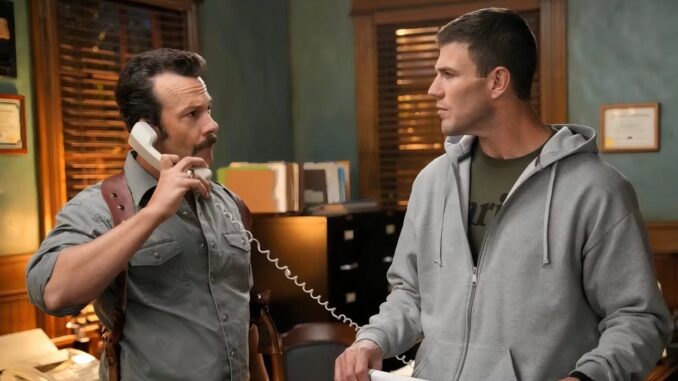
Why NCIS: Origins Episode 11 Worked Better Without Gibbs
Since its premiere, NCIS: Origins has been all about diving into the early days of Leroy Jethro Gibbs. But Episode 11 did something bold—it took a step back from Gibbs and gave the spotlight to other characters. Surprisingly, this shift actually made the episode better. But how? Let’s break it down.
A Bold Gamble That Paid Off
Gibbs is the heart of NCIS: Origins, but Episode 11 made a daring move by sidelining him for much of the episode. Instead of focusing entirely on the young Marine-turned-agent, the story explored other key players, proving the show has more depth than just its leading man.
Giving Supporting Characters a Chance to Shine
One of the biggest strengths of NCIS as a franchise is its ensemble cast. Episode 11 gave much-needed screen time to characters like:
- Mike Franks – His mentorship of Gibbs is crucial, but this episode let him take the reins.
- Mary Jo – Exploring her dynamic with other agents without Gibbs dominating the screen made for fresh storytelling.
- The New Recruits – A shift in focus allowed the rookies to develop beyond being just background characters.
Proving the Show’s Longevity Without Gibbs in Every Scene
For NCIS: Origins to thrive, it can’t always rely on Gibbs to carry the narrative. Episode 11 showed that the series can stand on its own, even when the lead character takes a step back.
How Did Sidelining Gibbs Improve the Episode?
1. It Created More Tension
Without Gibbs always solving the case, the stakes felt higher. The team had to rely on their own instincts, leading to more uncertainty and suspense.
2. It Let the Team Dynamic Evolve
Instead of always following Gibbs’ lead, the team had to step up. This shift showcased new relationships and challenges within the squad.
3. It Made Gibbs’ Presence Stronger When He Did Appear
Less is more. By keeping Gibbs in the background for part of the episode, his scenes had more impact when he finally took charge.
4. It Allowed More Character-Driven Storytelling
With less screen time dedicated to Gibbs, the show focused on deeper character moments—especially for Mike Franks and Mary Jo.

5. It Set Up Future Storylines
By exploring side characters in greater depth, the show laid the groundwork for future conflicts, backstories, and emotional stakes.
The Risk of an NCIS Show Without Too Much Gibbs
Of course, the biggest question remains: Can NCIS: Origins consistently work with less Gibbs? Episode 11 proves it’s possible, but if the show sidelines him too often, it might lose its core appeal.
Could This Strategy Work in the Long Run?
Possibly! If the writers continue to develop the supporting cast, the show could thrive even with episodes that don’t rely entirely on Gibbs’ presence.
What Fans Are Saying About Episode 11’s Approach
Reactions have been mixed, but many viewers appreciated the shift:
- Some fans loved seeing other characters take the spotlight.
- Others worried that too little Gibbs could weaken the show’s identity.
- Many agreed that the episode felt fresher and more dynamic.
How This Impacts the Future of NCIS: Origins
More Focus on Team Development
Now that the show has proven it can work without constantly leaning on Gibbs, future episodes might balance the spotlight more evenly.
Potential for More Gibbs-Free Episodes?
If this formula continues to work, we might see other episodes where Gibbs is sidelined to let others shine.
What This Means for the NCIS Universe
Could this approach influence future NCIS spinoffs? If audiences respond well, it might set a precedent for future series to focus more on ensemble storytelling.
Final Thoughts: Did NCIS: Origins Episode 11 Pull Off a Masterstroke?
At first, sidelining Gibbs seemed like a risky move. But Episode 11 proved that NCIS: Origins has the potential to be more than just a Gibbs-centric show. By allowing supporting characters to take charge, the episode added depth, tension, and fresh storytelling. If the show continues to balance its focus like this, it could carve out its own unique identity within the NCIS franchise.
FAQs
1. Why was Gibbs sidelined in NCIS: Origins Episode 11?
The episode took a different storytelling approach to explore the supporting cast and test if the show could thrive beyond just focusing on Gibbs.
2. Did fans like the Gibbs-free approach?
Reactions were mixed, but many viewers appreciated the shift in focus, while others worried about Gibbs taking a backseat too often.
3. Could NCIS: Origins continue without Gibbs in future episodes?
Possibly! If the supporting characters remain strong and engaging, the show could feature more Gibbs-free episodes while still keeping him central to the overall story.
4. What impact does this have on the future of NCIS: Origins?
It opens the door for more ensemble-driven storytelling, allowing different characters to shine and setting up fresh narrative directions.
5. Will Gibbs still be the main focus moving forward?
Yes, but Episode 11 proves the show can explore other characters while still maintaining its core identity centered around young Gibbs.
Would you like me to refine any part of the article further? 🚀